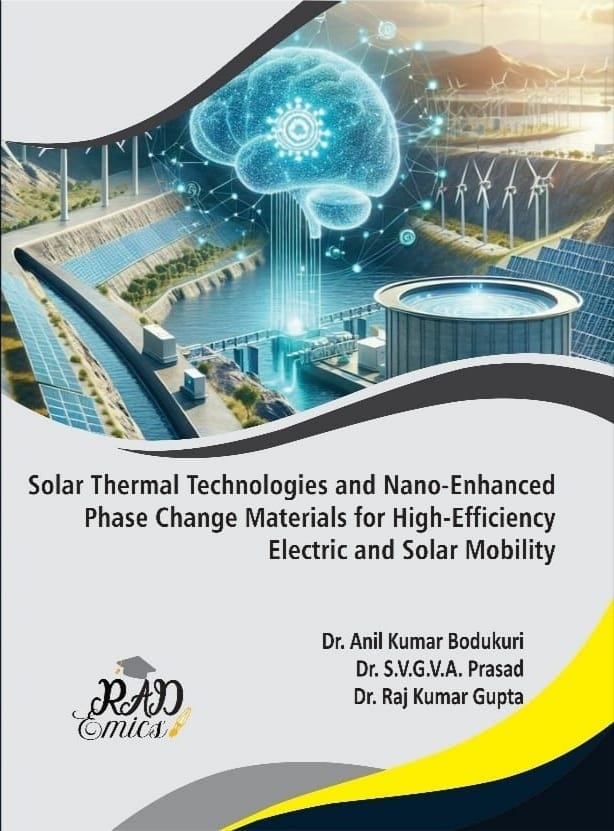
Author Name : Venkata Kiran Kumar Ravi, T S P L N Prasad
Copyright: @2025 | Pages: 38
DOI: 10.71443/9789349552654-15
Received: 24/01/2025 Accepted: 05/04/2025 Published: 27/06/2025
The global shift toward sustainable mobility necessitates advanced thermal management solutions capable of enhancing energy efficiency without compromising ecological integrity or economic feasibility. Nano-enhanced phase change materials (PCMs) have emerged as promising candidates for thermal regulation in electric and solar vehicles, offering superior latent heat storage, thermal conductivity, and lifecycle stability. The widespread adoption of these materials requires a comprehensive evaluation framework that transcends traditional techno-economic analysis. This chapter proposes an integrated model combining algorithmic intelligenceâ€â€Âencompassing life cycle assessment (LCA), machine learning optimization, and economic simulationâ€â€Âwith the human-centric philosophy of social pedagogy. The framework fosters a dual-axis evaluation system that quantifies environmental and economic performance while incorporating stakeholder values, behavioral dynamics, and ethical dimensions. A systematic methodology is presented to bridge data-driven models with inclusive learning ecosystems, enabling participatory decision-making, contextual knowledge transfer, and equitable technology dissemination. The framework is validated through multi-stakeholder simulation environments, emphasizing adaptability across diverse technological and socio-cultural landscapes. By aligning quantitative rigor with qualitative insight, this interdisciplinary approach provides a replicable model for responsible innovation in sustainable vehicle technologies. The chapter concludes with strategic directions for future research, highlighting the need for cross-sector collaboration, policy alignment, and continuous pedagogical evolution in advancing intelligent, inclusive thermal solutions for next-generation mobility.
The global push for decarbonization and climate resilience has catalyzed innovation across the transportation sector, especially in the domains of electric vehicles (EVs) and solar-powered mobility systems [1]. As traditional combustion engine technologies are phased out, thermal energy management becomes a pivotal concern in sustaining the performance, longevity, and safety of these alternative vehicles [2]. Phase change materials (PCMs), particularly those enhanced with nanomaterials, offer a transformative solution. These materials capitalize on latent heat storage and release, regulating temperatures efficiently and passively [3]. Nano-enhanced PCMs further elevate this capacity by improving thermal conductivity, energy density, and system responsiveness. The despite their promise, a comprehensive understanding of their sustainability and economic viability across the entire product lifecycle remains fragmented [4]. While performance attributes have been documented in laboratory conditions, real-world integration calls for a multidimensional evaluation strategy that spans material synthesis, system design, lifecycle deployment, end-of-life handling, and social acceptance [5].
Life Cycle Assessment (LCA) provides a rigorous analytical framework to quantify the environmental impacts of nano-enhanced PCM deployment in vehicle applications [6]. LCA tools assess multiple stagesâ€â€Âfrom raw material extraction and manufacturing to usage and disposalâ€â€Âoffering a cradle-to-grave perspective that is crucial for informed decision-making [7]. Yet, conventional LCA often operates in isolation from economic and societal variables, limiting its relevance in broader deployment scenarios [8]. Cost-benefit analysis, market readiness indices, and investment feasibility studies must be integrated to measure the true economic viability of such innovations. These assessments should be dynamic, data-driven, and responsive to regional, technological, and behavioral variations [9]. Advanced algorithmic approaches such as machine learning, optimization models, and digital twins can enrich LCA methodologies by enabling predictive analytics and real-time system modeling. This evolution transforms LCA from a static assessment tool into a dynamic decision-support mechanism that can guide policymakers, engineers, and manufacturers in designing more sustainable and cost-effective thermal systems [10].